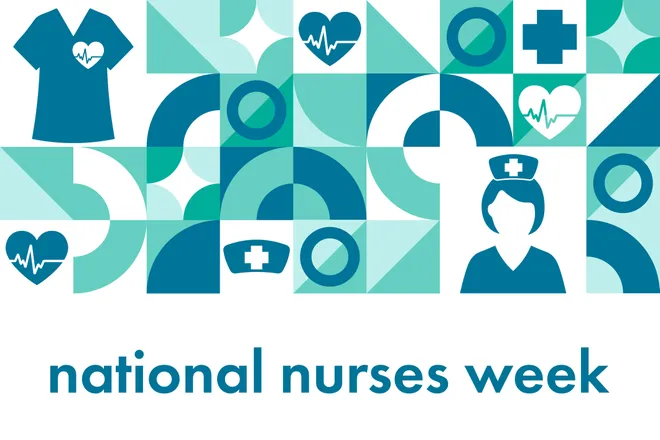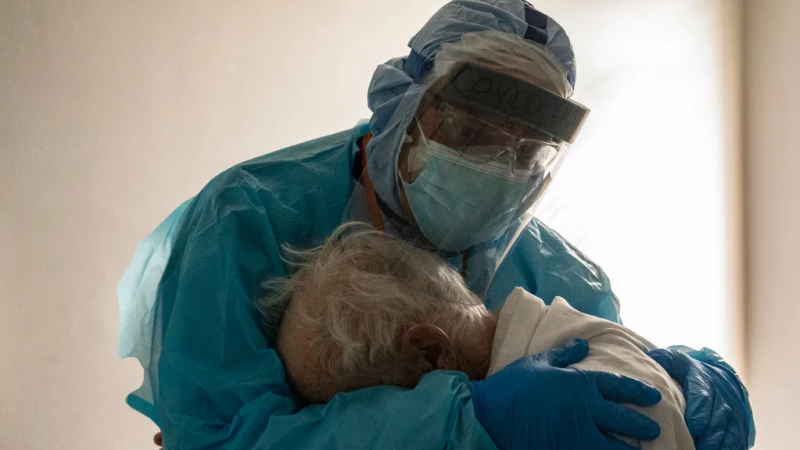National Nurses Week 2024: RN reflects on the state of the profession, calls for change

Monday, May 6 kicks off National Nurses Week, and it gives folks an opportunity to show their love and appreciation for the people who take care of the sick, injured and dying.
From neonatal nurses who help welcome newborns into the world to hospice nurses that provide peace and comfort to their dying patients, nurses play a crucial role in the medical industry.
According to the American Association of Colleges of Nurses, nurses make up the largest part of the healthcare workforce, are the primary health providers for patients in hospitals and give the most long-term care in the nation.
Restaurants and chains, like Chipotle and Dunkin', are offering discounts and coupons to the medical professionals to show their appreciation for what they do. But experts are saying that it isn't enough and what nurses need right now goes beyond discounts.
New nursing home staffing regulationsNursing homes must meet minimum federal staffing levels under Biden rule
Overworked
Catherine Kennedy, a registered nurse and the Vice President of National Nurses United, told USA TODAY that there needs to be systemic change on the federal level to give nurses the best chance to care for their patients.
A study published by the National Library of Medicine states that in 2021, nurses would work an average of "8.2 hours of paid overtime and 5.8 hours of unpaid overtime per week that year — making up the equivalent of more than 9000 full-time jobs."
According to a different study that analyzed a poll sent in from 29,472 registered nurses and 24,061 licensed practical nurses or licensed vocational nurses across 45 different states found that that 62% of nurses said they saw an increase in their work load during the COVID-19 pandemic.
According to those polled they felt the following at least “a few times a week” or “every day:”
- 50.8% felt "emotionally drained"
- 56.4% felt "used up"
- 49.7% felt "fatigued"
- 45.1% felt "burned out "
- 29.4% felt "at the end of their rope"
Despite being labeled as heroes during COVID-19, Kennedy said nurses were not given the support they needed to do their jobs properly.
"Nurses were in tears because they could not provide the proper care," said Kennedy. "So a lot of nurses left nursing and other states because of that."

Difference between 2020 and now
According to Kennedy, nurses have always struggled to fight for better working conditions. But, when cases of COVID surged and the world shut down in 2020, "it got worse."
She said nurses had to fight to make sure they had the proper equipment they needed to protect themselves, and adds that that hasn't changed four years later.
Hospitals and medical institutes are using the same techniques they did at the height of the pandemic to cut costs and it comes at the expense of nurses' safety, said Kennedy.
"It is still a constant battle to make sure that nurses are protected [and] have what they need as it relates to proper [personal protective equipment.]"
She adds that it's been an "ongoing battle" just to make sure the working conditions are safe for patients and nurses.
Safe working conditions
Safe working conditions for nurses doesn't just include having enough masks to protect oneself. It means having enough nurses and aides on staff to provide the care patients need without overworking an understaffed team.
"Every day that we walk through the doors of a hospital, we wanna be able to do the things that we've been trained to do and that's to take care of our patients," said Kennedy.
But, she adds that having to fight to be properly staffed, errors in patients' admission and racial discrimination play a factor in how well nurses can do their job.
Kennedy said that it's important to allow nurses to "do what we do best and that's taking care of patients, and we can't do that if we don't have safe working conditions."
According to National Nurses United, when nurses "are forced" to focus on too many patients, patients are at a higher risk of the following:
- Preventable medical errors
- Avoidable complications
- Falls
- Injuries
- Pressure sores
- Longer hospital stays
- Higher numbers of hospital readmissions
- Death

Nurses push for change by backing proposed staffing standards act
To avoid complications related to overwork, exhaustion and burnout, the union supports the Nurse Staffing Standards for Hospital Patient Safety and Quality Care Act of 2023, S. 1113 and H.R. 2530.
Although the act was introduced a year ago in March 2023 it is still awaiting approval.
If passed, the act will require hospitals to enforce a nurse-to-patient ratio and limit the number of patients a nurse can be assigned.
Hospitals will also have to post notices of what the nurse-to-patient ratio is in each unit, record ratios in every shift and follow a procedure that determines how the ratio is determined for each unit. It will ban other staff from performing tasks that should be done by a nurse unless they are "specifically authorized within a state's scope of practice rules."
The act also states that a nurse can refuse assignments if "it would violate minimum ratios or if they are not prepared by education or experience to fulfill the assignment without compromising the safety of a patient or jeopardizing their nurse's license."
Kennedy said that a nurse-to-patient ratio will improve work conditions and bring nurses back to their jobs.
California already has a ratio in place and Kennedy said it improves working conditions.
When Kennedy worked as a nurse before the ratio was put in place, she saw anywhere from 12 to 24 patients a day. Now, she only sees five.
According to the union, the ratio law reduced costs for hospitals, improved nurse safety and job satisfaction and reduced the following:
- Spending on temporary RNs,
- Overtime costs
- Staff turnover
"California is not an island," said Kennedy. "And so federally, we need to push the ratio law because the patients are no different in California than they are in Mississippi or Montana."
Disclaimer: The copyright of this article belongs to the original author. Reposting this article is solely for the purpose of information dissemination and does not constitute any investment advice. If there is any infringement, please contact us immediately. We will make corrections or deletions as necessary. Thank you.






